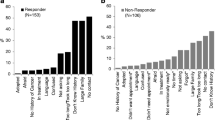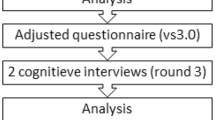Abstract
Patient self-initiated consultations to discuss family history of cancer in primary care and the factors leading to these consultations have not been investigated. Seventy-one out of 150 asymptomatic patients with a family history of cancer at the Yorkshire Cancer Genetics Service participated in this study. A semi-structured questionnaire was administered. The results show that (1) family cancer events, doctors’ advice and reaching the age of cancer-affected relatives were more salient in raising awareness of the added cancer risk due to family history than media and publicity, and knowledge of the genetics services; (2) knowledge of family medical history and its clinical value is not easy to ascertain; (3) the inter-relationships with other causal beliefs are of interest and could provide insights to understand the factors motivating patients to discuss family history or cancer risk; (4) the belief that ‘cancer runs in the family’ or is ‘a family thing’ may not be sufficient to heighten perceived cancer risk and motivate patients to seek medical advice; and (5) understanding of the medical concept and clinical value of family history is poor even in this group of patients who initiated the GP consultations. In conclusion, because most primary care practitioners are likely to rely on patient initiated discussion to identify individuals at an increased risk of cancer because of their family history, these findings are therefore important to help doctors and health providers understand the reasons influencing asymptomatic patients to self-refer themselves in primary care and discuss cancer risk in order to provide appropriate care.
Similar content being viewed by others
Explore related subjects
Discover the latest articles and news from researchers in related subjects, suggested using machine learning.References
Al-Habsi H, Lim JNW, Chu CE, Hewison J (2008) Factors influencing the referrals in primary care of asymptomatic patients with a family history of cancer. Genet Med 10(10):751–757
Andermann A, Watson EK, Lucassen AM, Austoker J (2001) The opinions, expectations and experiences of women with a family history of breast cancer who consult their GP and are referred to secondary care. Community Genet 4:239–243
Brain K, Gray J, Norman P, Parsons E, Clarke et al (2000) Why do women attend familial breast cancer clinics? J Med Genet 37:197–202
Claus EB, Risch NJ, Thompson WD (1990) Age at onset as an indicator of familial risk of breast cancer. Am J Epidemiol 131:961–972
de Bock GH, Vliet Vlieland TPM, Hakkeling M, Kievet J, Springer MP (1999) GPs’ management of women seeking help for familial breast cancer. Fam Pract 16:463–467
Department of Health. Our inheritance, our future. Realising the potential of genetics in the NHS, June 2003
Emery J, Kumar S, Smith H (1998) Patient understanding of genetic principles and their expectations of genetic services within the NHS: a qualitative study. Community Genet 1:78–83
Evans DGR, Burnell LD, Hopwood P, Howell A (1993) Perception of risk in women with a family history of breast cancer. Br J Cancer 67:612–614
Guagdognoli E, Ward P (1998) Patient participation in decision making. Soc Sci Med 47:329–339
Johnson N, Lancaster T, Fuller A, Hodgson S (1995) The prevalence of a family history of cancer in general practice. Fam Pract 12:287–289
Kash KM, Holland JC, Halper MS, Miller DG (1992) Psychological distress and surveillance behaviours of women with a family history of breast cancer. J Natl Cancer Inst 82:24–30
Katapodi MC, Lee KA, Facione NC, Dodd MJ (2004) Predictors of perceived breast cancer risk and the relation between perceived risk and breast cancer screening: a meta-analytic review. Prev Med 38:388–402
Kinmonth A, Reinhard J, Bobrow M, Pauker S (1998) Implications for clinical services in Britain and the United States. BMJ 316:767–770
Lucassen A, Watson E, Harcount J, Rose P, O’Grady J (2001) Guidelines for referral to a regional genetics service: GPs respond by referring more appropriate cases. Fam Pract 18:135–138
Lynch HT, Watson P (1990) Editorial commentary: early age at breast cancer onset—a genetic and oncologic perspective. Am J Epidemiol 131:984–987
Lynch HT, Watson P, Conway T et al (1988) Breast cancer family history as a risk factor for early onset breast cancer. Breast Cancer Res Treat 11:263–267
McAlister M (2003) Personal theories of inheritance, coping strategies, risk perception and engagement in hereditaty non-polyposis colon cancer families offered genetic testing. Clin Genet 64:179–189
Moser C, Kalton G. Survey methods. Social Investigation, 2nd edition. London: Heinemann Educational, 2004
Murabito JM, Evans JC, Larson MG et al (2001) Family breast cancer history and mammography. Am J Epidemiol 154:916–923
Pilarski R (2009) Risk perception among women at risk for hereditary breast and ovarian cancer. J genetic counselling 18(4):303–312
Qureshi N, Standen PJ, Hapgood R, Hayes J (2001) A randomized controlled trial to assess the psychological impact of a family history screening questionnaire in general practice. Fam Pract 18:78–83
Rapport F, Iredale R, Jones W, Sivell S, Edwards A, Gray J, Elwyn G (2006) Decision aids for familial breast cancer: exploring women’s view using focus groups. Health Expect 9(3):232–244
Rees G, Fry A, Cull A (2001) A family history of breast cancer: women’s experiences from the theoretical perspective. Soc Sci Med 52:1433–1440
Reid R (2007) How women with a family history of breast cancer understand their situation and the role that the media play in the construction of meaning. University of Leeds. Ph.D Thesis
Stacey D, O’Connor AM, DeGrasse C, Verma S (2003) Development and evaluation of a breast cancer prevention decision aid for higher-risk women. Health Expect 6(1):3–18
Stermer T, Hodgson S, Kavalier F, Watts S, Jones R (2004) Patients’ and professionals’ opinions of services for people at an increased risk of colorectal cancer: an exploratory qualitative study. Familial Cancer 3:49–53
Suchard M, Yudkin P, Sinsheimer J, Fowler G (1999) General practitioners’ views on genetic screening for common diseases. Br J Gen Pract 49:45–46
Walter FM, Emery J (2005) ‘Coming down the line’—Patients’ understanding of their family history of common chronic disease. Ann Fam Med 3:405–414
Walter FM, Emery J, Braithwaite D, Marteau TM (2004) Lay understanding of familial risk of common chronic diseases: a systematic review and synthesis of qualitative research. Ann Fam Med 2(6):532–533
Warner E, Goel V, Ondrusek N et al (1999) Pilot study of an information aid for women with a family history of breast cancer. Health Expect 2(2):118–128
Watson EK, Shickle D, Qureshi N, Emery J, Austoker J (1999) The ‘new genetics’ and primary care: GPs’ views on their role and their educational needs. Fam Pract 16:420–425
Watson E, Austoker J, Lucassen A (2001) A study of GP referrals to a family cancer clinic for breast/ovarian cancer. Fam Pract 18:131–134
Conflict of interest
The authors declared no conflict of interest.
Author information
Authors and Affiliations
Corresponding author
Rights and permissions
About this article
Cite this article
Lim, J.N.W., Hewison, J., Chu, C.E. et al. Factors influencing consultation to discuss family history of cancer by asymptomatic patients in primary care. J Community Genet 2, 19–26 (2011). https://doi.org/10.1007/s12687-011-0034-4
Received:
Accepted:
Published:
Issue Date:
DOI: https://doi.org/10.1007/s12687-011-0034-4




